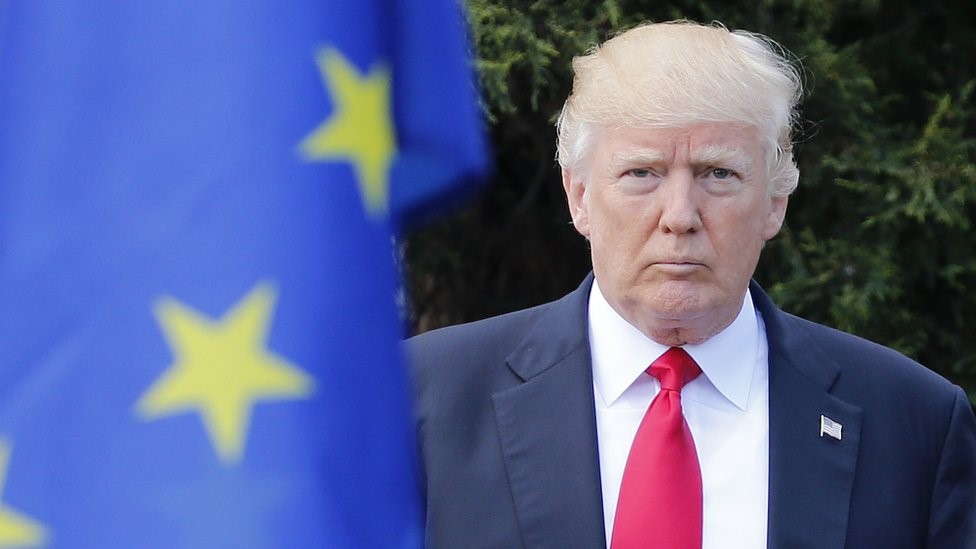Nine months out from November’s presidential showdown, Europe isn’t just biting its nails, it’s actively bracing for the possibility of Donald Trump’s encore in the Oval Office, and its leaders are making one stupid statement after the other.
Trump’s first act on the global stage was nothing short of a blockbuster, for better or worse, depending on who you ask. His approach to the transatlantic alliance had Europeans reeling, scrambling to adjust to a reality where the US, their longtime protectors, started singing a different tune. Their biggest fear is that Trump 2.0 would crank up the volume, leaving promises to defend NATO allies in the dust and Ukraine hanging by a thread, all while giving Russia are not so subtle Nod of approval. Trump’s role as the tough love protagonist or antagonist, depending on your view, has certainly left its mark. His pay up or else, approach to NATO sure did light a fire under Europe’s collective bum. Norbert Röttgen, a seasoned player in German politics, painted a stark picture, a Europe sans Uncle Sam’s security blanket, a scenario unseen since the credits rolled on World War 2.
Join us on Telegram: https://t.me/tfiglobal
The irony, of course, is that many of Trump’s European critics, despite their disdain for his methods and madness, secretly nod in agreement over a painful truth. Europe has been riding the American Security coattail for far too long. And so, the thought of Trump taking the White House stage once more has injected a dose of adrenaline into efforts to make Europe stand on its own feet, militarily and geopolitically. Because for Europe, the idea of facing Putin in a battlefield alone is as appealing as a cold shower in December. With June elections looming in Europe, a wave of nationalist parties echoing Trump’s skepticism about Ukraine, threatens to stir the pot even further.
Enter Valérie Hayer, France’s gift to the European Parliament, who advocates for a Europe that flexes its well…non-existent muscles without relying on Uncle Sam’s gym membership. The concept is bold. The execution, however, is a headache inducing puzzle, of costs, complexities and time Europe, despite its economic might, find itself in a sort of a David versus Goliath scenario against Russia, with only a beer bottle in hand. The UK and France might have nukes, but their arsenals are like fireworks that fizzle out before they go boom. And as for conventional forces, standing up to a full-scale invasion, let’s just say without the American cavalry, Europe’s defense strategy looks more like hope than an actual plan. So as Europe braces for the possibility of Trump round two, the continent finds itself at a crossroads, caught between the desire for sovereignty and the realities of security.
Read More: Trump’s Rule Sparks German Fears of NATO Collapse!
The European Union has a grand plan to play the wizard for its 27 member states in the weapons manufacturing and distribution game next month. They are set to debut their European Defense industrial strategy. Sort of a dating app for defense capabilities, hoping to swipe right on a stronger, more self-sufficient union. Ursula von der Leyen, playing the role of the hopeful romantic, insists these moves aren’t about ghosting the US, but rather about making Europe more attractive. Partner, “Let’s beef up our industrial base and keep the transatlantic flame alive”, she mused at the Munich Security Conference, batting her diplomatic eyelashes. German Foreign Minister Analena Baerbock called NATO our life insurance, a sentiment not universally echoed, but it’s a desperate cry for status quo and as a senior German lawmaker, Röttgen puts it in the face of Trump’s potential comeback in Europe’s lagging preparations – Better late than never. One thing is clear, Europe’s quest for self-reliance and a robust defense strategy is a tale of ambition, uncertainty, with a more than healthy dash of desperation. Even if they create an EU army, how many French soldiers will march on the German general’s orders? History is the study of the old. But Europe’s history is not all that old. Talking about history. Europe has a history of undermining Russian history.
